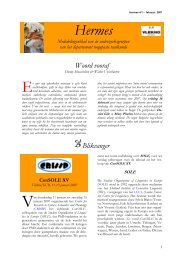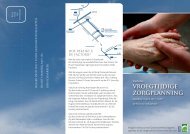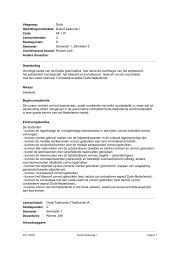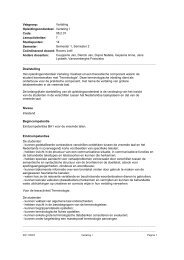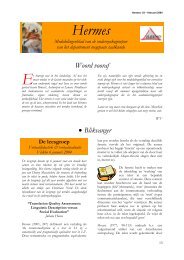HUB RESEARCH PAPER - Hogeschool-Universiteit Brussel
HUB RESEARCH PAPER - Hogeschool-Universiteit Brussel
HUB RESEARCH PAPER - Hogeschool-Universiteit Brussel
Create successful ePaper yourself
Turn your PDF publications into a flip-book with our unique Google optimized e-Paper software.
Process consultation revisited 21<br />
are still using a close variant of the T-group as a first week residential workshop to build a<br />
learning community. The aim there is reflection and consensual validation of the “here and<br />
now”; the ongoing interactions and relationships among the participants (as in process<br />
consultation). This level of reflection is negotiated with the participants when the common goal<br />
is to learn about interdependence and group development towards further maturity levels<br />
(Bouwen & Fry, 1996). The quality of interacting can enable the reflexive dialogues about<br />
mutual feedback and social sense making. Continuously keeping an eye on the level of<br />
authenticity, transparency and reciprocity enacted in the ongoing interactions is an important<br />
working principle. In this kind of training and development groups, the task is the relational<br />
work itself. Participants give feedback on each others’ being and acting in the group and<br />
experiment with new forms of interacting that are more supporting the joint learning goals. The<br />
being together is learning together. The essence of this process is so closely relation and context<br />
bounded that it becomes difficult to speak in general terms about it.<br />
During the two years, a series of residential workshops is set up, where the learning is<br />
around the here-and-now ongoing relational practice, the jointly created role plays, simulations<br />
of life cases and the joint practicing in the field in common organizational change projects. A<br />
group of participants in a similar program from abroad, joins in for a week to create common<br />
practices for cross-cultural exchange learning and multi-party collaboration experiences. The<br />
learning context becomes also the context for meaning creation. The learning experience can<br />
directly be connected to meaningful practice and the classical problem of transfer does not<br />
emerge because of the richness of the learning context itself. Enacting, experiencing and<br />
reflecting on common relational practices is the continuous learning ground for organizing<br />
processes on all levels.



